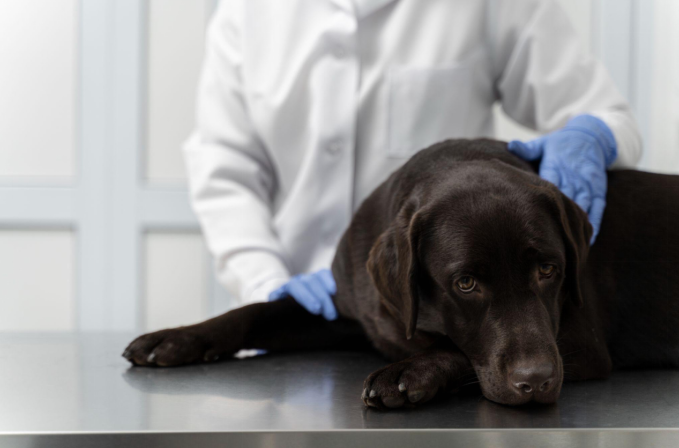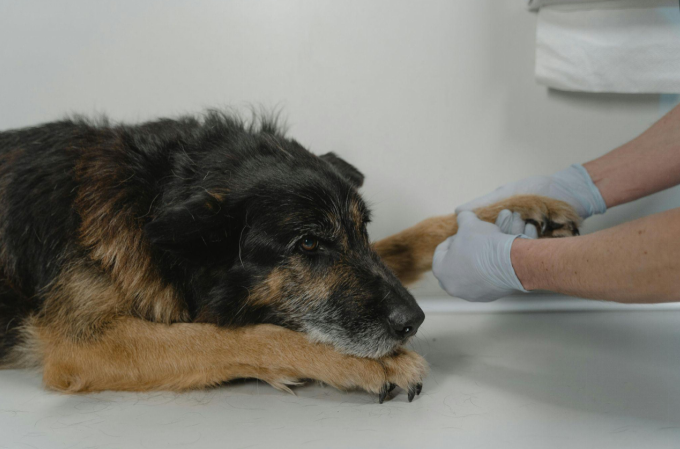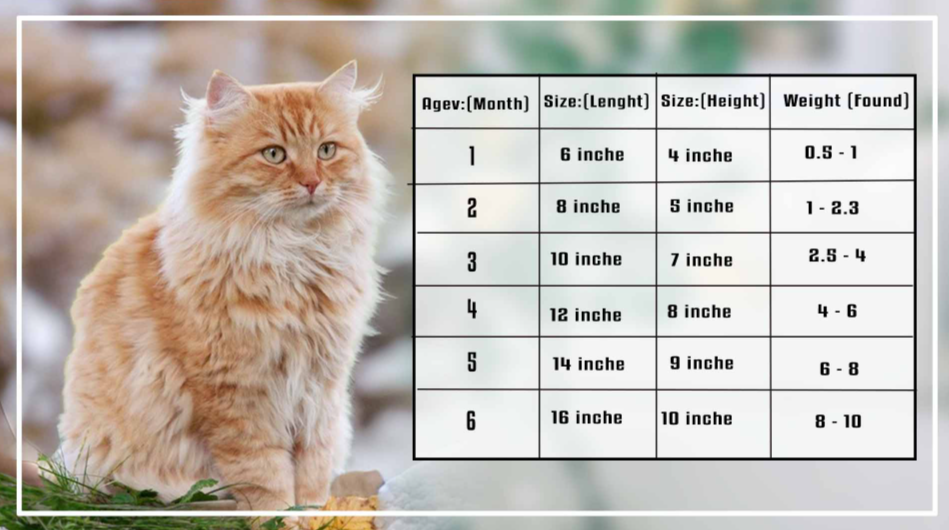Sep 02, 2025
Author:Lisa Martinez
The presence of blood in dog's stool can be the most terrifying experience to any dog owner. When you see your dog pooping blood in their poop, you begin to think of the worst that can occur.
Yet, the understanding of causes, symptoms, and treatment plans can help you to act in a proper manner and present your furry friend with the support that they need. The occurrence of blood in dog poop is not new, as it can occur in any age and breed of dog.
The early detection of indicators and knowing the cause why my dog is pooping blood can make a huge difference to your pet's recovery and overall health levels. In this ultimate guide, you will find all you need to know to be able to navigate this dangerous issue with certainty and capability.

Fresh, bright red blood usually means that the source of the bleeding is somewhere below your dog’s digestive tract (such as the colon or the rectum). You might find out that your dog has blood in the stool that looks like a streak of blood on the surface or quite blended with her stool.
Black tarry stool means that thick bleeding has occurred in the upper intestinal tract, the stomach or the small intestine. This complication occurs when the intestines have failed to digest all the blood in the intestinal tract resulting in the faeces turning black or dark brown in color.
Sometimes you may notice dog poop like jelly with blood. This is a sign of inflammation or pain in the large intestine. Such a mucous-like texture alongside blood points to some infection, like Colitis or other inflammatory bowel issues.
● Hemorrhagic gastroenteritis: Hemorrhagic gastroenteritis is one of the worst cases of blood in your dog’s stool. The symptoms of this condition are sudden development of bloody diarrhea and vomiting, without an obvious cause.
● Dietary indiscretion: Dog pooping problems are commonly related to the consumption of trash, rotten food, and other substances that may irritate the gastrointestinal system, making it bleed.
● Parasites/intestinal worms: A common cause of blood in dog stool among the younger dogs and puppies. Hookworms, whipworms, and coccidia are especially the cause of bloody diarrhea.
● Stress: Changing residential area, exposure to new pets, and other routine changes can cause stress that, in some cases, can include bloody stool in some cases.
● Inflammatory bowel disease: A serious, acute condition which can result in permanent indigestion. This issue should be treated by a prolonged management and a regulated diet.
Digestive problems resulting in bloody stools are more prone to particular age groups and breeds. Puppies are quite susceptible because of their weak immune system and more exposure to the world as they are curious to explore.
Older dogs with a weak immune system can be prone to bloody stools and require more attention.
Digestive intolerance is breed specific as well. By understanding the breed-related risks of your dog, you will be able to take the precautions needed to avoid them.

One of the confusing situations arises when you find your dog pooping blood but acting normal. Your pet may retain the normal eating habits, energy level, and playfulness, and yet give bloody stools. This may be quite confusing to pet owners.
When dogs seem in perfect condition, any blood in the dog's poop should be checked by a vet. Serious conditions may come slowly, and dogs are amazing creatures in terms of hiding the discomfort and pain. Major problems can be hidden under the seeming normalcy of behavior and need to be treated.
Minor reasons such as small anal gland problems or minor dietary disturbance may not have a significant impact on the overall behavior of your dog at first, but do not be fooled, though, because these seemingly minor issues can progress into more serious ones to the long-term well-being of your pet.
Immediately call your vet in case your dog is pooping blood and throwing up. This blend has the potential to result in dangerous dehydration and needs to be addressed with immediate medical treatment to avoid complications.
When there is severe loss of red blood that turns bright red or incessant diarrhea that is bloody, then it is time to consult a veterinarian. Other signs of emergency are general lethargy lasting more than 24 hours and lack of appetite.
Older dogs and young puppies are more vulnerable to the issues that come up as a result of bloody stool and demand more urgent uations. These age groups are susceptible to a sudden degeneration and demand immediate professional uation upon exhibiting digestive symptoms.
One of the best prevention measures to many causes of bloody stool is to maintain good digestive health through proper nourishment. Regular feeding times will stabilize the digestive system of your dog and lessen the strain on the tract.
Automatic pet feeders are the best tool to keep things in order by having your pet fed on schedule, irrespective of what you are engaged in. These feeders will ensure that your dog eats at a consistent rate, which aids in having a healthy digestive system and avoids digestive problems that could cause bloody stool.
The quality of food is essential to digestive health. The food that has high-quality, digestible proteins and a limited number of ingredients has the potential to reduce the risk of food-related drooling or diarrhea. A change of diet should be avoided as this may produce bowel disorders that can give rise to bloody stools.
Healthy digestion requires sufficient hydration to help avoid numerous ailments that can result in issues with blood in dog stool. Water allows your dog to have a well-digested system, along with the absorption of nutrients and elimination of wastes.
Water fountains can help increase the amount of water consumed by dogs. Provide them with clean running water, as it amuses them. Dogs prefer running water over a bowl of still water, and fountains will ensure that water is fresh each time your dog drinks it.
Periodically checking the bathroom schedule of your dog is also a must so that you can become aware of the problem at its earliest stage. Be familiar with what is normal with regards to the consistency, color, and regularity of your dog stools, so you can be able to see any changes that may indicate health issues that may have set in.
Maintain a health journal to note any provided changes in your dog in terms of bowel movements, appetite, behavior, or anything general. This specific data would prove to be extremely useful when you need to discuss possible health issues with your veterinarian and monitor trends over periods of time.
Prevention measures also include vet check-ups at regular intervals, fecal examination, and parasite-prevention systems. By adopting these precautionary measures, you and your health provider are in a good position to detect and prevent some of these causes of bloody stools before they develop into more serious conditions.
Excluding the possibility of greater exposure by isolating your dog to garbage, rotten food, and any other substance that may cause it harm. Close attention should be paid when young dogs are taken outside to handle their walks and other activities, as they are more likely to consume dangerous materials.
Once you note that your dog is having blood in their stool, call your veterinarian as soon as you can. The detailed description of the origin, frequency, as well as how the bloody stools have manifested themselves, combined with the accompanying symptoms, are necessary.
Your veterinarian may prescribe some tests, such as fecal, blood tests and imaging in order to determine the origin of the problem. Adhere to the guidance given by them. Failing to finish medications as prescribed will lead to no improvement.

Learning all about the causes of blood in your dog's stool and how to respond to it effectively allows you to take better care of your dog. Although the discovery of blood in dog poop is always alarming, there are so many remedies that can be adopted through appropriate veterinary attention.
The best support you can give your dog in terms of digestive health is to maintain regular eating schedules, engage in good hydration, and to make frequent visits to the vet. The presence of any signs of a dog pooping blood is an indication of professional treatment by a veterinarian.
Good quality feeding systems and fresh water sources are also contributing factors to proper digestive wellness. By exploring this wide range of pet care products, you can be sure of providing the right solution to your dog’s health.
Label:
Popular Post

What to Feed a Sick Dog With No Appetite? [2025 Guide]
May 16, 2023

Troubleshooting Common Issues with Automatic Pet Feeders: Tips & Tricks for Pet Owners
Oct 26, 2023

What is a standard Cat Weight chart by age Kg?
Mar 19, 2025

Why Does My Cat Cough After Drinking Water? 8 Potential Reasons
Mar 13, 2023

Why is My Cat Throwing up Water? Top 5 Causes Here
Feb 08, 2023
$109.99
$129.99
Copyright © 2025 WOPET. All Rights Reserved.